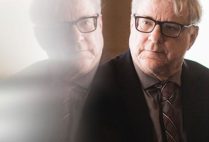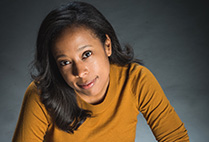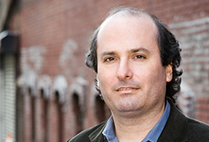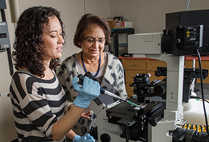Remembering Gerald Fitzgerald
I was saddened to learn of the death of my former faculty adviser and freshman English professor Gerald Fitzgerald (Faculty Obituaries, Winter–Spring 2017). He was such a dear, sweet man and so helpful to me during that clueless stage in my life. So many thoughts well up, but three need to be expressed.
The first is perfunctory, a typo. He could not have joined the BU English department as late as 1969. In fall 1966, I began his two-semester course at BU on the history of English literature.
The other two are things he said; they are not perfunctory. One was poignant and the other was prescient.
I remember Professor Fitzgerald telling us that he was drafted into the army during the Korean War. For anyone who knew him, this alone would be hard enough to get one’s mind around. But he went on to tell us that in order to get through the trauma and humiliation of inspections during basic training, he would silently recite lines from T. S. Eliot’s The Waste Land. This image has stayed with me ever since.
Here is the third: last fall, when the Nobel Committee announced its pick for the literature prize, I was flabbergasted, but not because of their selection. I was flabbergasted because my mind went back to that 1966–67 course, when Professor Fitzgerald one day announced that Bob Dylan was “America’s greatest living poet.” Most of us were Dylan fans, I would guess, but honestly, we thought our learned professor had gone off the rails. Little did we know.
Bruce A. Bennett (CAS’72)
Ashfield, Mass.
I was saddened to learn that Gerald Fitzgerald passed away last year. I was enlightened by your obituary, with regard to the many honors, positions, and accomplishments of his professional career at BU, as well as his poetry and time-off activities. I was a member of the freshman class at CAS (in the Six-Year Medical Program) in fall 1965. Assistant Professor Fitzgerald was my mentor in freshman English literature. That is why I was confused when your article stated that he joined the BU English department in 1969. Was that true? Please clarify the dates. Thank you very much and again, your obit was great.
Myron A. Shoham (CAS’71, MED’71)
Vienna, Va.
ED. NOTE: Professor Gerald Fitzgerald joined Boston University in 1963. We regret the error.
Praise for Jessica Stern
I want to congratulate the author as well as the subject of the feature story on Jessica Stern (“Why Terrorists Kill,” Winter–Spring 2017). It was an excellent article about an extraordinary woman. I found it very moving. I believe this is my first letter to the editor of Bostonia, and I have been an alum for many years.
Claire Rubin (GRS’62)
Arlington, Va.
Inspired by Hockey Terriers
Your profile of Mike Sullivan (Questrom’90) (“How to Win a Stanley Cup,” Winter–Spring 2017) paid an excellent tribute to a fantastic coach and BU alum. I grew up in Central Pennsylvania when Mario Lemieux sparked the success of Pittsburgh Penguins hockey. But my love for hockey took flight during my four years at BU. Inspired by watching [BU assistant coach] Scott Young, [head coach] David Quinn (CAS’89), and Clark Donatelli (Sullivan’s replacement at Wilkes-Barre/Scranton), I learned to skate, thanks to phys-ed classes included in my tuition at BU, and later became a USA Hockey Certified Ice Hockey Official (now retired). Coach Sullivan was elevated to the Penguins at a critical time in Pittsburgh, with a lot of pressure to succeed. He delivered with the utmost class (as did former Terrier Nick Bonino). I am proud to have a fellow Terrier coach my favorite pro hockey team. Keep up the great work, Coach Sullivan.
Michael Routch (CAS’88)
Duncansville, Pa.
Evidence-Based Climate Strategy
It is good news that Boston University is cutting its energy use and moving toward divestment from fossil fuels (“Trustees Adopt Broad Climate Change Strategy,” Winter–Spring 2017). Evidence-based investment makes sense. The clean energy sector is growing, and reliance on fossil fuels is increasingly problematic, for fiscal managers as well as for our economy, health, and national security.
Boston University should endorse national legislation for carbon pricing. Citizenship is not just doing the right thing, but also advocating for policies that protect us all. US law gives fossil fuels four times more in tax credits than clean energy. We need a market correction.
“The Conservative Case for Carbon Dividends” (George P. Shultz, James A. Baker, et al., 2017) [a Climate Leadership Council report] recommends a national revenue-neutral carbon fee and dividend with a border tariff. A rising fee on fossil fuels, with revenue returned to the public, would let energy efficiency and clean energy compete on a more level playing field. It would also create new jobs, strengthen the economy, and show young people that we are planning for their future.
Louise Seeley Stonington (LAW’73)
Seattle, Wash.
Regarding your article on the Board of Trustees’ new strategy to curb investments in companies that extract coal, tar sand, oil, and most carbon intensive fuels, let’s not ignore the 91 currently active volcanoes that are continuously releasing carbon dioxide into our atmosphere every day. Also, with the new technologies to eliminate gas contaminants with clean coal and clean oil processing, let’s get up-to-date with the production of the critical energy sources that still support the majority of the global energy needs for our modern lifestyle.
Peter Parsons (COM’65)
Mission Viejo, Calif.













































Related Stories
Trustees Adopt Broad Climate Change Strategy
Cutting energy demand and avoiding investment in coal, tar sands included
Trio of Terriers Inducted into US Hockey Hall of Fame
Jack Parker, Scott Young, and Ben Smith chosen for 2017 class
BU Faculty Petition Urges Divestment from Fossil Fuel Companies
Trustees will consider request, pledges President Brown
Post Your Comment